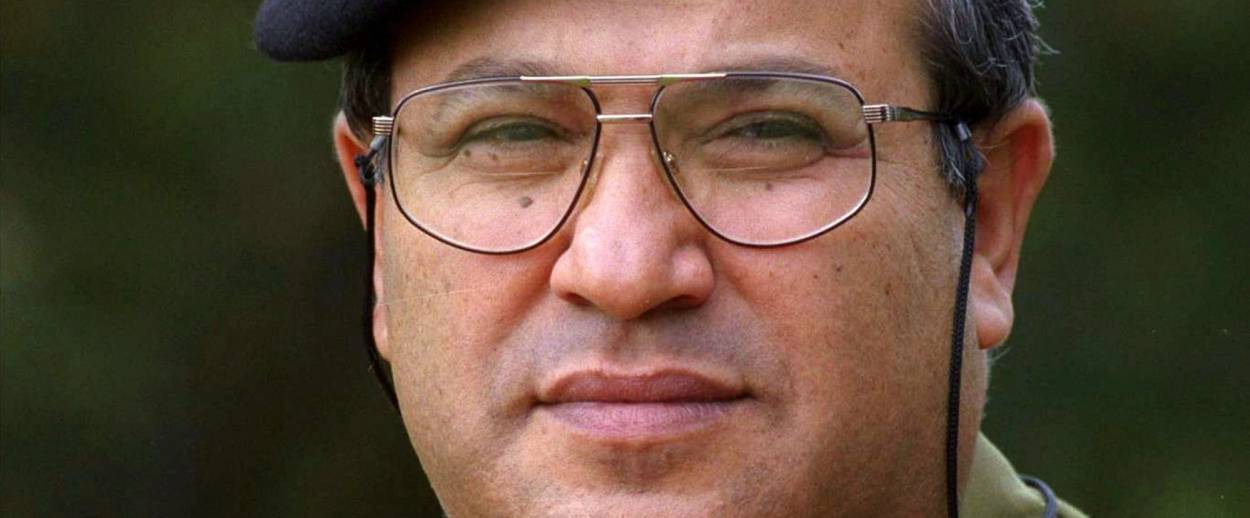Meir Dagan, Former Head of Mossad, Dies at 71
Nicknamed ‘Superman’ by his Arab opponents, Dagan was a fierce and smart warrior who was unafraid to speak his mind




Throughout the course of his long and storied career, Meir Dagan, the former head of Mossad who passed away on Thursday at the age of 71, always kept the same photograph hanging on his office wall. It showed a man named Baer Ehrlich, a gaunt thirty-something with sunken eyes, kneeling on the ground, surrounded by men in Nazi uniform who are looking at the camera indifferently. Several minutes after the photograph was taken, the Nazis murdered Ehrlich, Meir Dagan’s grandfather. The photograph reminded Dagan of two things: that his struggle against the enemies of the Jews was personal, and that he had only one concrete job description—never again.
He was born in the Ukraine in 1945, and made aliyah with his parents five years later. He joined the Israel Defense Forces in 1963, and proved himself a skillful and daring commander. When Ariel Sharon, then the head of the army’s southern command, sensed a swelling of terrorism in Gaza in 1970, he appointed Dagan as the head of a new unit called Rimon, whose members dressed up as Palestinians and infiltrated the local communities to identify and neutralize terrorists before they strike. Dagan’s extraordinary success at this particular task was a credit to both his intelligence and his courage; during his years of fighting terrorism, he was awarded one of the IDF’s most prestigious medals, Itur Ha’Oz, for storming a Palestinian assassin who had pulled the safety pin off of a hand grenade and was getting ready to toss it at Dagan and his men.
With each new promotion, Dagan’s legend continued to grow, and he was revered as an impossible combination of a warrior and an intellectual.Uzi Dayan, Israel’s former deputy chief of staff, recently recalled meeting Dagan for the first time when they were both young officers and Dayan was assigned to serve under Dagan’s command.
“I was walking around headquarters and I saw a very small man throwing knives,” Dayan said. “I asked him if he knew where Meir Dagan was, and he said ‘that’s me.’ I told him he needed to interview me [as his new deputy], and he asked, ‘can you throw knives?’ I said yes. He tested me, and I did fine. So he took out a gun and asked ‘can you shoot?’ I asked him if he meant I should fire the weapon right there, in the middle of HQ, and he said yes. We held a quick shooting contest, and I did even better. So he asked me ‘do you listen to classical music?’ I said no, not really. ‘I knew it,’ he replied, ‘I knew the army only sent me second-rate people.’ ”
The same candor guided Dagan throughout his long career. When he retired from the army, after 32 years of service, he became Prime Minister Yitzhak Rabin’s counter-terrorism adviser, but disliked what he perceived as Labor’s willingness to abandon the Golan Heights, and joined Likud in 2000, becoming a senior adviser to his old commanding officer, Sharon. In 2002, Dagan was asked to become the head of the Mossad.
His tenure there was particularly long—he served for ten years—and successful. While the Mossad’s work is, of course, covert, several stellar operations have been attributed by the international press to Dagan and his agents, including the assassination of Imad Mughniyah, Hezbollah’s number two. When Masoud Alimohammadi, an Iranian nuclear physicist, was assassinated in 2010, Cairo’s influential newspaper Al Aharam ran a long article on its front page attributing the assassination to Israel. “Of course the Iranians know who is behind the assassination of Masoud Alimohammadi last Tuesday,” read the article. “Every Iranian official knows that the keyword is ‘Dagan.’ ” The article concluded by awarding the head of Mossad a nickname that stuck in the Arab world ever since: Dagan, claimed Al Aharam, was Superman.
After his retirement, Dagan remained as vocal and as uncompromising as ever, becoming one of Prime Minister Benjamin Netanyahu’s fiercest critics and strongly opposing an Israeli strike against Iranian nuclear targets, which, he believed, will only strengthen the Ayataollah’s regime. As he waged this public battle, another, private one began consuming him: he was diagnosed with advanced-stage liver cancer in 2012, and was secretly flown to Belarus, where he had a liver transplant later that year. Today, he lost the war, his life’s last. Jews everywhere owe him an immense debt of gratitude for keeping the promise he’d made frequently while looking at his grandfather’s photo, the promise of refusing to ever again abandon his people to the mercy of armed strangers.
Related: Uncloaked
Liel Leibovitz is editor-at-large for Tablet Magazine and a host of its weekly culture podcast Unorthodox and daily Talmud podcast Take One. He is the editor of Zionism: The Tablet Guide.